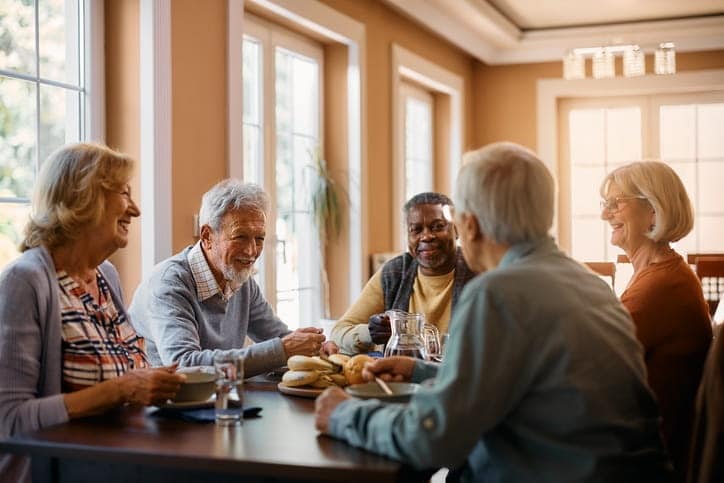The human body changes as people age, affecting bodily systems and increasing the risk of injuries. You could spend months or years coping with an elderly parent’s injuries after an accident at home or elsewhere.

Prepare an aging parent to move to an assisted living facility by learning about common reasons seniors have accidents, common senior accident injuries, taking steps to prevent elderly accidents through home and lifestyle changes, ways to provide in-home support, and understanding how assisted living facilities can help. With clear, transparent communication and careful planning, you can help your parent transition to an assisted living facility.
What are the main causes of accidents among older adults?
Common types of accidents among the elderly include the following:
- Car accidents: Vision loss affects 25% of those 80 and older. Aging also affects cognitive functions, slowing a person’s response times. These are two reasons why car accidents injured over 250,000 elderly adults in 2019.
- Falls: Weakened muscles and bone loss cause issues with balance. Falls are the most common cause of senior injuries, affecting 33% of elderly persons each year.
- Kitchen accidents: Issues with memory and cognitive functions contribute to kitchen fires, which are the fifth leading cause of accidental death for seniors
What are the most common injuries suffered by older adults?
Elderly persons are more likely to suffer the following accident injuries:
- Broken bones
- Choking
- Poisoning
- Traumatic brain injuries (TBIs)
How can we prevent elderly persons from having accidents at home?
You can prevent senior accidents at home by modifying the home environment to increase safety. Some steps you can take include the following:
- Add lighting throughout the home to improve visibility
- Install handrails in bathrooms to prevent falls
- Install handrails on staircases
- Install no-slip strips in the bathtub or replace the tub with a walk-in shower with a seat
- Remove door knobs and install levers
- Secure loose carpet, fix flooring to prevent trips and falls, and install no-slip strips on steps and flooring
Other senior accident prevention strategies include the following:
- Choose nutritious microwave dinners for aging parents to prevent them from using the stove
- Hire someone to cook for your aging parent
- Hire someone to provide outdoor maintenance services, such as applying de-icer and removing snow after storms
- Invest in transportation services, such as an Uber driver, or drive your parent to appointments, stores, and social gatherings
How can you prevent injuries as you get older?
Steps you can take to prevent injuries as you age include the following:
- Dress appropriately: Loose clothing increases your risk of falls because your clothing can catch on furniture or cause you to trip
- Eat healthy foods: Prevent bone loss by consuming enough calcium and vitamin D
- Stay active: ‘Use it or lose it’ applies to mental and physical functions. Exercising improves your balance because it helps you maintain muscle and bone mass, reducing the risk of falls.
- Take multivitamins: Vitamins can help reduce vision loss as you age
Relocating is another way to prevent injuries. Moving to a senior care facility ensures you have everything you need and expert staff available to provide support. Assisted living facilities include housing. You can opt for a bedroom or maintain more independence by moving to an apartment in an assisted living facility. Caregivers provide standard services, such as food preparation and house cleaning, and assist with bathing and dressing.
Skilled nursing facilities provide the same services as assisted care facilities and additional medical services for older persons with more significant care needs. These medical centers provide treatments based on the residents’ needs. Treatments include memory care, occupational therapy, physical therapy, and wound care.
How can you help a parent transition to assisted living?
Caring for an elderly parent after an accident is more than a full-time job. It’s natural for injured seniors to feel frustrated and struggle with depression because their injuries prevent them from being independent and enjoying preferred activities. It can be difficult for them to accept the help they need.
You can help your parent make the transition with the following :
- Communicate:
-
- Talk to your parent about their needs, hopes, and plans for the future
- Discuss their finances
- Explain all feasible options. Your parent may have their heart set on living with you, but if you work long hours or have a small home with safety hazards, that might not be feasible.
- Ensure they understand the options available to them
- Plan ahead: Don’t wait until relocating is urgent. It’s best to begin making plans before your parent suffer severe injuries.
- Consider social and emotional needs: It’s common to talk about how assisted living facilities help people with physical challenges, but assisted living facilities also help older persons struggling with loneliness and depression. Assisted living facilities offer social activities and allow residents to spend time with peers daily.
- Be transparent: Take your parent to visit assisted living facilities, familiarize them with their options, and consider their input. Involve them in decisions about when to sell their home and move.
- Be candid: Talk about other people’s injuries or deaths from age-related accidents and help your parent understand you want to preserve their health by preventing accidents with a move to assisted living
Assisted and skilled nursing facilities can help

Haven Health’s skilled nursing facility provides the daily living and medical assistance your elderly parent needs. Whether they need physical therapy to address mobility issues or are recovering from joint replacement, our team of licensed and certified medical professionals ensures they get quality care for all their needs.
Contact Haven Health today to learn how we can provide the care your aging parent needs.
Sources:
Common Injuries as We Age. (2023).
5 Most Common Causes of Accidental Death Among Seniors. (2023).
Healthy aging. (2023).
Pelletier, A., et al. (2016). Vision Loss in Older Adults.